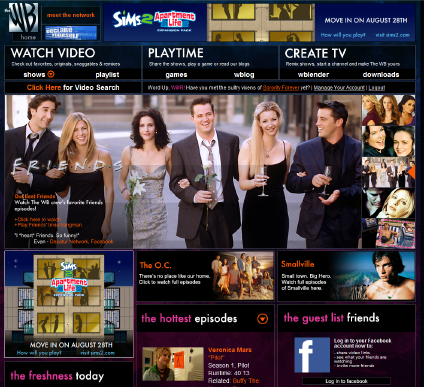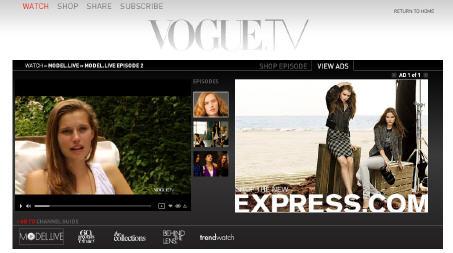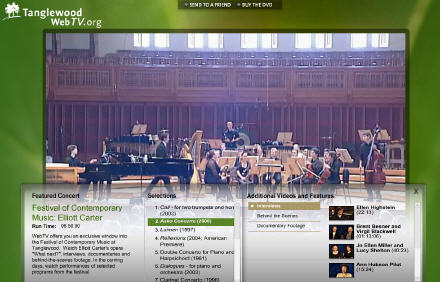-
Why NBCOlympics.com's Video Ad Revenues Don't Matter - Part 2
Two days ago, I posted "Why NBCOlympics.com's Video Ad Revenues Don't Matter." I'll take the risk today of "beating a dead dog" by writing again about this same topic, for a couple of reasons.
First, there were some great comments on the site and I received many emails both supporting and challenging my arguments. (As a sidenote, I've discovered an interesting dynamic with VideoNuze - though I've repeatedly tried to encourage readers to post comments so all readers are able to see, folks seem more comfortable just emailing me directly for a one-on-one dialogue. I'm not going to resist human nature here, but again, I would love even more if you share your reactions by posting a comment so the whole community benefits!)
Second, the real trigger for writing a follow-up part 2 today is an incident I experienced yesterday. I gave a
 presentation about broadband video to a group of investors. These were mainly people who are familiar with broadband video, but not necessarily steeped in it. Upon finishing up and opening the Q&A, an early question/comment was, "Hey Will you lay out great points about broadband, yet I just read somewhere earlier this week that even NBC's Olympic video, which should have been a big revenue opportunity if ever there was one, generated little money for NBC and looks like it was a total failure for them. Given that, why should people bother investing in this medium? It doesn't seem promising."
presentation about broadband video to a group of investors. These were mainly people who are familiar with broadband video, but not necessarily steeped in it. Upon finishing up and opening the Q&A, an early question/comment was, "Hey Will you lay out great points about broadband, yet I just read somewhere earlier this week that even NBC's Olympic video, which should have been a big revenue opportunity if ever there was one, generated little money for NBC and looks like it was a total failure for them. Given that, why should people bother investing in this medium? It doesn't seem promising."Ugh. Ugh. Ugh. This is exactly the perception that I sensed would be created out of the blogosphere's and mainstream media's coverage of eMarketer's NBCOlympics.com revenue estimate. And why it is so vital that people interested in broadband video not get distracted by this single data point. Instead, maintaining perspective about where the industry stands and what needs to be done to grow should be the real focus.
I totally get the point made by people in their comments and emails that video providers must show they can make real money in the broadband medium. Ultimately, that's paramount. In particular it's key that broadband not get tagged as the "digital pennies" medium, in contrast to the traditional "analog dollars" model.
But I'll continue to insist that the path to industry revenues and profits begins by demonstrating the technical/operational viability of the broadband medium, massive user adoption of it and differentiated engagement with it. To be sure, progress is being made on all fronts. Still, there is still a long road ahead to drive significant shifts in advertiser spending to broadband. If you're a media buyer today, you're very intrigued by broadband and are likely experimenting with it.
But you're looking for more proof points before making bigger spending commitments. Can broadband's architecture scale to handle massive traffic loads, or are the Chicken Littles right that the Internet will crash under video's massive weight? Can broadband video's quality compare with TV, and HD in particular? Given the broadband choice, will users in fact shift their consumption patterns? And if they do, how different will their awareness and engagement with ads be? Importantly, when is broadband video actually going to be widely and easily available on TVs, not just computers?
These are but a few of the questions repeatedly being asked. And many of these are what NBCOlympics.com has helped to answer. NBC could have done lots of things to squeeze more money out of its Olympics video (though my guess is that no matter what revenue they generated cynics would have still said, "Is that all?"). Instead they focused on user value/experience and pushed the broadband envelope considerably. Others are doing the same. More needs to be done, and I believe it will.
As the saying goes, "Rome wasn't built in a day." So too with this exciting new medium. Revenues will not gush immediately. Staying focused on the core building blocks is the key. In short, I'm bullish long-term, but highly realistic short-term.
What do you think? Please post a comment! Or send me an email if you really prefer!
Categories: Broadcasters, Sports
Topics: eMarketer, NBC, Olympics
-
Join Me at Contentonomics on October 7th in LA
I'll be moderating a session at a new show called "Contentonomics" on October 7th in LA. Started by the gang over at Contentinople, who I've come to know well over the last 6 months, it's shaping up to be a dynamic new educational and networking opportunity for industry participants.
My session is "The Syndicated Video Economy: From Social Networks & Broadband Channels to Blogs" and features four great panelists:
- Gary Baker, Founder and CEO, ClipBlast
- Greg Clayman, EVP, Digital Distribution and Business Development, MTV Networks
- Jimmy Hutcheson, President, EgoTV
- Damon Berger, Director of Programming, Revision3
Contentinople is running a registration special of just $99 for a short time. You can register here. In the "Promotional Code" field at the bottom of the form, fill in "SPECIAL."
Hope to see you there!
Categories: Events
-
TheWB.com Launches Public Beta - Nice Execution, Fuzzy Strategy
TheWB.com's curtain is finally going up, with the site set to officially open for public beta at 11am Pacific Time today. Along with fellow analysts and press, I was given a sneak peek at the site and so I'm able to offer some initial impressions. At first blush, and after having some of my specific questions answered by a WB spokesman, my reaction is that the site is executed well, but that its strategy seems fuzzy.
As many of you know, TheWB TV channel went off the air in September, 2006. In April, 2008 Warner Bros. Television Group announced that it would launch TheWB.com as an online network. The new site contains a mix of about 20 classic WB and Warner Bros. programs and a slew of forthcoming original web-only programs created by big-name talent. Many of the classic programs have cult-like followings and will no doubt find an ardent online audience.
In addition, TheWB site has some nifty features such as a mashup capability called "WBlender" powered by Adobe Premiere Express, video search powered by Digitalsmiths (including full scene-by-scene indexing of all programs which allows search at the dialogue, character, location, episode, session and series level) and a pretty deep Facebook app allowing users to share content back and forth.
While these features all will eventually raise the bar for other sites, certain aspects are not yet fully implemented. For example, WBlender today only offers users a paltry 30 or so pre-selected clips and just 6 soundtracks to mash. Later this year the selection will widen when the WBlender is married to the video search feature, allowing all scenes from all shows to be mashed together. It's not clear whether users will be able to clip specific segments themselves from favorite episodes or not.
Overall, the site's execution is solid except for a few minor personal quibbles that aren't worth spending time on here. I believe a far bigger issue is the site's fuzzy strategy. A WB spokesman told me that "TheWB.com is not meant to be an archival library of every episode of every show ever made, but rather an entertainment destination that gives our viewers a lot of great entertainment, along with a reason to come back again tomorrow." This is meant to give "our programmers the ability to create themed programming blocks that mesh with our audience's sensibilities."Yet how TheWB.com actually translates this strategy into which programs and episodes are available on the site at any given time is where I think it's going to generate considerable user frustration, not to mention a lack of competitiveness with its own syndication outlets.
Three shows "Friends," "Buffy the Vampire Slayer" and "Angel" illustrate the point. With "Friends" just 7 episodes are currently available on the site, inexplicably from 7 different seasons. If there's a thematic thread, it is neither stated on the site, nor intuitive to me. If I want to watch a specific episode from a particular season, I'm out of luck. Meanwhile TheWB.com shortchanges "Angel" and "Buffy" fans by offering just the first 5 episodes of each, while Hulu, as one example, already offers 22 and 34 episodes each program, respectively.
I think it will quickly become evident that TheWB.com's strategy to "program" its online network is at odds with the on-demand desires of users seeking unfettered access to the full catalog of all programs. Here we see legacy linear TV thinking being grafted onto a high-potential online platform, with the result being a confusing sub-par user experience.
I know I've said this before, but I continue to believe that Hulu is the reigning broadband video user experience king. Having cracked the code on how to deliver fast growth and user loyalty, TheWB.com would be wise to go to school on Hulu and borrow liberally from lessons it has already learned and acted on well.
Still, in fairness, this is still just the beta of TheWB.com. There's a lot to be excited about here, but getting the site's strategy aligned with user expectations is a key building block to eventual success.
What do you think? Post a comment now.
Categories: Broadcasters
Topics: Hulu, TheWB.com, Warner Bros.
-
Why NBCOlympics.com's Video Ad Revenues Don't Matter
There was much reporting yesterday of eMarketer's estimate that NBC generated revenue of $5.75 million from its broadband Olympics video. The firm's press release dismissively called the sum "a passable performance." Others, from the blogosphere to mainstream media piled on, characterizing NBC's video revenues as underwhelming, using terms such as "pittance," "piddling," and "unimpressive."
Let's hold on a second here. At the risk of sounding like an irrepressible NBC supporter, I'd like to offer the alternative viewpoint: NBCOlympics.com's video ad revenues actually don't matter.
Don't get me wrong, when it comes to high-stakes Olympics broadcasting - and a sagging economy to boot -
 every dime counts. Rather, my point is that by focusing on the broadband ad number (which at virtually any level would have been a mere rounding error on NBC's $1 billion+ of overall Olympic ad revenues) we are getting distracted from NBC's real and very valuable broadband accomplishments.
every dime counts. Rather, my point is that by focusing on the broadband ad number (which at virtually any level would have been a mere rounding error on NBC's $1 billion+ of overall Olympic ad revenues) we are getting distracted from NBC's real and very valuable broadband accomplishments.Consider this: there were more on-demand and live sports choices for Olympics viewers than ever, NBC and its technology partners conquered herculean operational challenges without any major snafus and the foundation was laid for broadband to play an increasingly important and integral role in all future iconic programming events.
Focusing just on the operational achievements for a moment, a conversation I had yesterday with Brick Eksten, President of Digital Rapids, the company that provided all of the video encoding and streaming technology for NBC's live streaming events was a reminder of all the complexities NBC and its partners took on. There were up over 100 live simultaneous feeds that needed to be ingested, encoded in multiple bit-rates and delivered in real time across the globe to the right distribution points. All of this had never been done before.
Unlike domestic implementations or those focusing mainly on on-demand delivery, live broadband delivery from China meant spec'ing out all the delivery systems in advance and then shipping all of the gear well in advance of the event itself. There were many unknown variables, beginning with the vast potential range of concurrent users. So long hours were invested by partners modeling different scenarios to meet targeted delivery quality goals. Compounding matters, Brick explained that due to space, manpower and time limitations, Digital Rapids and others were challenged to push their systems to do things not previously done.
Meanwhile, NBC faced a pioneer's balancing act, simultaneously trying to preserve the value for its on-air broadcast rights/supporting advertisers, while meeting consumers' expectations for broadband on-demand access to everything. NBC could have chosen to charge for broadband access (as CBS originally did with March Madness, and as MLB continues to do) or provide only highlights clips or nothing via broadband at all. Instead, it offered up - at no charge - 2,200 hours of live streaming and 3,000 hours of on-demand.
Some fans on the sidelines have groused this wasn't enough. Now some analysts are saying that NBC could have generated more ad revenue if it had opened the broadband spigot further. These comments miss the bigger point: NBC moved the broadband market dramatically forward with its Olympics coverage. Focusing on what NBC proved with the first "Broadband Olympics," rather than what attributable revenue it generated, is what's most important for all of us to remember.
What do you think? Post a comment now.
Categories: Advertising, Broadcasters, Sports
Topics: CBS, Digital Rapids, MLB, NBC, Olympics
-
Microsoft Invests in Move Networks, Jointly Power Democratic Convention Video
Move Networks will officially announce tomorrow morning that Microsoft has joined its Series C round as a strategic investor. The $46 million round was unveiled last April and was led by Benchmark Capital. The two companies also recently announced that Move would be integrated with Microsoft's Silverlight media player. The curtain on this first example of their integration is going up momentarily as the companies have also announced they're powering the video feed from the Democratic convention at http://www.demconvention.com/.
With the convention video, Microsoft continues the momentum Silverlight generated during the just-wrapped up '08 Summer Olympics. Meanwhile Move burnishes its reputation for high-quality delivery gained through deals with ABC, Discovery, Fox and others. These two are natural partners.
Categories: Deals & Financings, Partnerships, Technology
Topics: Microsoft, Move Networks
-
Vogue.TV's Model.Live: A Magazine Bets Big on Broadband
I've been writing for a while now that broadband gives non-video media companies a whole new strategic growth opportunity. This is especially true for magazines with well-defined brands, strong advertising relationships and sought-after audiences. Few magazines fit that description as well as Vogue, Conde Nast's high-end fashion bible. So I was pleased to read about a month ago that Vogue intended to launch Model.Live, a 12 episode original broadband-only series, in a partnership with IMG.
Model.Live went live recently, and I've caught the first couple of 8 minute episodes. Shot in a reality/documentary style, Model.Live follows the lives of 3 young and aspiring models. With a budget of $3 million, these productions do not feel like run-of-the-mill low-end indie video. There are multiple camera angles, great lighting, and extensive on-location shoots. Absent are the high-end graphics and faux cliff-hanger moments typically seen on TV contest shows.
While many will find the subject matter and dialogue insipid (19 year-old Dutch model Cato's mildly defiant "I can party when I'm 30..." justification for deferring college is a classic eye-roller); my guess is that for Vogue readers and for those interested in the fashion world, these authentic behind-the-scenes peeks will be quite intriguing. For example, in episode 2 we hear Cato's mother expressing her authentic unease with the modeling world's fame and glamour (of course, her star-struck sister more than offsets these reservations).
The video player allows sharing through email, and easy downloading to iPods. Curiously though, there's no commenting or rating available, two tools now widely used to generate audience interactivity. Also missing is any email or RSS alert function so it's not clear how a fan would know when the next episode will be released. There's not even a teaser for what's coming next, a standard promotional tool for serialized TV shows.
Still, Vogue has definitely nailed certain things. It is smartly distributing Model.Live on the social network Bebo, which is sure to gain the show widespread visibility among targeted younger audiences (it is supposed to be available on Hulu and Veoh as well, though searches at both sites yielded no results). And, for a deal in the reported "low seven figures," it signed up Express to be the program's sponsor. Express gets huge visibility in the right panel of the video player, with clothing purchases a few clicks away. Vogue's ability to drive awareness and revenue for Express will certainly influence whether Model.Live continues on after its first season.
Model.Live actually follows several other programs Vogue has released ("Behind the Lens," "The Collections," Trend Watch") yet, it is clearly the most ambitious. These kinds of shows are a natural extension for the brand, and I believe are essential as Vogue seeks to engage an increasingly online audience seeking out video. Other magazines should be taking note.
What do you think? Post a comment.
Categories: Advertising, Indie Video, Magazines
Topics: Bebo, Conde Nast, Express, IMG, Vogue
-
Tanglewood and BSO Pioneer Broadband Use for Arts/Cultural Organizations
Tanglewood, the summer home of the Boston Symphony Orchestra (BSO), and also the host of world-renowned musical training programs, has expanded its use of broadband video, helping pioneer how arts and cultural organizations can tap into the power of this new medium. I talked recently with Rich Bradway, Associate Director of Ecommerce and New Media to learn more.
First, for those unfamiliar with Tanglewood, it is a lush former estate in Western Massachusetts' Berkshire Mountains containing an outdoor theater and other performance buildings. Open only for the summer, it hosts a mostly classical program, but also features performances by the contemporary Boston Pops and others like James Taylor (whose annual concerts draw over 20,000 fans). For many the Tanglewood experience means elaborate picnics on its expansive lawn, followed by a moonlit night or lazy afternoon of beautiful music.
This summer, the BSO has created TanglewoodWebTV.org, with its first "episode" around the centenary of the birth of Elliott Carter, a well-known composer who's being celebrated in Tanglewood's 2008 Festival of Contemporary Music. Previously the BSO has launched BostonPops.TV, and both are powered by PermissionTV. Rich explained that Tanglewood and the BSO are using broadband to build awareness, reach a younger and more global audience and drive new revenues.
The episode includes performances along with interviews, documentaries and behind-the-scenes footage. The presentation is very non-linear with an overlay menu providing easy navigation to other video segments, so the user can sample at will. Rich said prior to launch the episode was seeded with archival video, and then during the Festival week it was updated continuously. Since broadband is new for the Tanglewood team a key goal was understanding what's involved in the digital media workflow and how to scale the process over time.
With BostonPops.TV and TanglewoodWebTV.org, the BSO is helping prove in broadband's benefits for other arts and cultural organizations. Yet, as Rich and I talked, I mentioned that it seems to me the really big opportunity here is to stream live concerts from Tanglewood, and then make them available on-demand afterwards. This would extend the full Tanglewood experience to remote users in the same way that the Saturday afternoon radio broadcasts of the New York Metropolitan Opera have been doing for decades. Consistent with that model, the streaming should be free and sponsored, rather than paid by the user.
Rich said that the BSO and Tanglewood have been doing the spade work to enable paid concert downloading, focusing on both technology infrastructure and addressing rights issues with the orchestra itself. Rich reminded me that this is all very new territory for a traditional organization. I understand that and the value of a "walk before you run" approach. Still, for arts and cultural organizations like the BSO and Tanglewood, broadband is presenting exciting opportunities to extend their brands and build new revenues; I believe that these should be pursued as aggressively as possible.
What do you think? Post a comment.
Categories: Indie Video
Topics: BSO, Tanglewood
-
American Political Conventions are Next Up to Get Broadband Video Treatment
As the first "Broadband Olympics" begin to wind down, the American political conventions are next up to get the broadband video treatment. While certainly not Olympian in their popularity, the conventions still have a rabid following among many, and given the particular dynamics of this year's election cycle, they are attracting far broader interest than usual.
The conventions have evolved a lot over the years. Traditionally they were a high-stakes drama culminating
 in a roll call vote whose outcome was often uncertain. They have become a largely drama-free corporate-sponsored schmooze-fest punctuated by a few high-profile keynote and nominee acceptance speeches. Broadcasters have taken note, steadily reducing their coverage and opening the door to cable networks to do the primary convention coverage.
in a roll call vote whose outcome was often uncertain. They have become a largely drama-free corporate-sponsored schmooze-fest punctuated by a few high-profile keynote and nominee acceptance speeches. Broadcasters have taken note, steadily reducing their coverage and opening the door to cable networks to do the primary convention coverage.  In '04 the Internet crashed the conventions, primarily in the form of bloggers reporting on every convention utterance made. The bloggers will be out in full force at the '08 conventions too, but this time around broadband coverage is going to be the big story. Here's a partial list of what's on tap:
In '04 the Internet crashed the conventions, primarily in the form of bloggers reporting on every convention utterance made. The bloggers will be out in full force at the '08 conventions too, but this time around broadband coverage is going to be the big story. Here's a partial list of what's on tap:Democrats plan to deliver live, gavel-to-gavel HD streaming at their site. Republicans plan live streaming as well and announced Ustream.tv as their official partner.
The Democrats also plan a Spanish language simulcast produced by Comcast, to be available online and also on-demand for Comcast subscribers. The Dems are also producing a 15 minute daily show called "Countdown to America's Future" available through Comcast VOD and online.
CBS anchor Katie Couric is taking on broadband assignments, delivering web-only specials for the first time.
Politico.com and Yahoo have partnered with the Denver Post and St. Paul Pioneer Press to host a series of eight political forums which will be streamed live.
Corporate siblings WashingtonPost.com and Newsweek.com will deploy a team of journalists providing live streaming via their cell phones using an application from Comet Technologies.
Meanwhile, in the lead-up to the conventions, the YouTube Convention video contest, asked users to answer the question, "Why are you a Democrat/Republican in 2008?" Winners are here and here.
For those that don't take their politics too seriously, Jon Stewart, Stephen Colbert and many other comedians will no doubt have viral clips flying around the 'net. Going one comedic step further, Generate and MSN announced just this week the premiere of "Republicrats" a satirical broadband-only series with 24 episodes running though Election Day.
I'm sure there's more broadband convention coverage I've missed, so please post a comment regarding further coverage.
Categories: Politics
Topics: Comcast, Generate, MSN, Newsweek.com, Political conventions, WashingtonPost.com, YouTube





